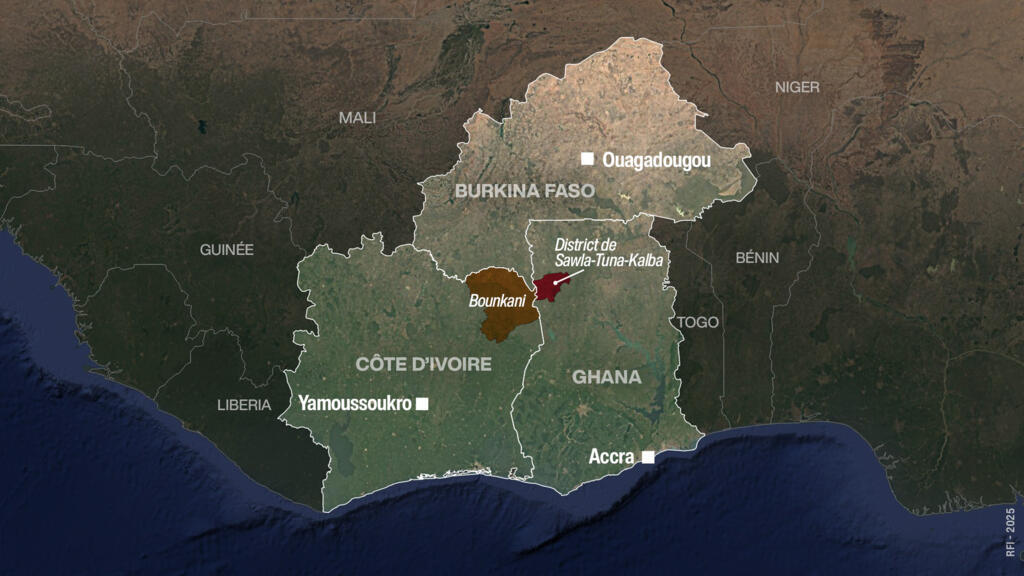
At least 31 people have been killed and thousands displaced in clashes between ethnic groups in north-western Ghana. The Ghana Red Cross has warned of a critical humanitarian situation for about 50,000 people forced to flee their homes.
The violence broke out on 24 August in the village of Gbiniyiri, Savannah Region, near the borders with Côte d'Ivoire and Burkina Faso. The Birifor and Gonja ethnic groups, who have long disputed land ownership in the area, were involved.
The conflict reportedly began when the local chief sold a parcel of land to a private developer, without broader community consent, French news agency AFP reported. When the developer attempted to access the land to begin work, residents resisted violently.
Frustration reached a peak when the chief's palace was set on fire, and the violence spread quickly to surrounding communities.
Thousands of Cameroonians flee to Chad after deadly intercommunal violence
Violence and trauma
Ghana's Red Cross says around 50,000 have fled the area. More than 13,000 have sought refuge across the border in Cote d'Ivoire, Ghanian officials said on Thursday.
Ivorian authorities have reported the arrival of 10,000 Ghanaians in the Bounkani region, a figure confirmed by Ghana's National Disaster Management Organisation (Nadmo), which visited the area.
Some sources also mention Ghanaian refugees in the Noumbiel province of Burkina Faso, according to RFI's correspondent in Accra.
Nadmo said people forced from their homes were mostly women and children. Eight people died in a boat accident while crossing the Black Volta to reach Cote d'Ivoire, it said.
While communal disputes over land and chieftaincy are recurrent in the north of Ghana, displacement on this scale is rare.
In a statement published on Tuesday, the Ghanaian Red Cross warned of a dire humanitarian situation with "insufficient and overcrowded" tents, food shortages, inadequate medical supplies and an increased risk of disease spreading due to lack of access to clean water.
Women, children and elderly people were "exposed to violence and trauma", it said.
Climate crisis drives record displacements as planet exceeds 1.5C
Curfew introduced
Two days after hostilities began, Ghanaian authorities deployed an additional 300 law enforcement officers to the region followed by an indefinite curfew.
The violence appears to have calmed down. Savannah regional police told RFI on Tuesday there had been no clashes in the three previous days.
On 31 August, Ghana's President John Dramani Mahama dispatched a security delegation to the region. The presidency said discussions were underway between "regional security, local traditional chiefs and community stakeholders to promote dialogue".
But the scale of the casualties and destruction, and the speed with which the violence spread, have sparked criticism of the authorities’ response.
"The problem is that the fighting is not taking place within communities, but in the bush," says local journalist Eliasu Tanko. "It's therefore very difficult for the authorities, deployed in communities, to intervene."
However, the Tamale-based journalist, who specialises in security issues in northern Ghana, admits he was surprised by the scale and violence of the fighting.
The Birifor and Gonja peoples "do not have a history of clashes, they're peasant farmers," he told RFI. Despite age-old tensions between the groups "especially during the dry season when herders arrive in the area and destroy crops", he insists they generally end up resolving their differences peacefully.
He argues the scope of the current clashes risks creating a dangerous precedent across borders.
"The Birifor have a certain ethnic proximity with their Ivorian and Burkinabé neighbours. Some members of the same family can live on one side or the other of the borders. If the conflict persists, we can fear reprisals from the Birifor, assisted by their brothers from Côte d'Ivoire or Burkina Faso."







